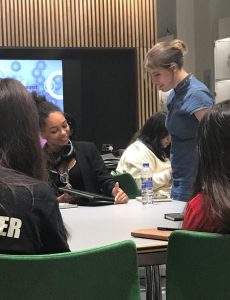“On the shelf”: the creation of the George Orwell archive
By Sarah Pipkin, on 14 January 2026
“On the Shelf: 200 years of building UCL’s library collections” is the 2026 Main Library Exhibition. It focuses on eight different collections across UCL’s libraries. In this post, Becky Sims, Head of Archives, writes about the creation of the George Orwell archive.
When George Orwell’s second wife, Sonia, approached David Astor, the proprietor of the Observer newspaper, for help in finding a suitable home for the residue of the writer’s papers, he turned for advice to Sir Ifor Evans. Evans was then Provost of UCL and former Professor of English Language and Literature. UCL had already established a reputation for forward-thinking collecting policies in the field of literature (having acquired, for example, the Ogden Library, James Joyce collection, Poetry Store and Little Magazines collections), and Sonia agreed that UCL was a suitable home for Orwell’s papers as well as his library.

Photograph of Sonia Orwell, c. 1951. UCL Special Collections, ORWELL/T/3/B/2/6
The first boxes were presented to UCL, on permanent loan, in 1960. Over the years Sonia continued to add to the archive from her own collection, and UCL Library’s accession registers from this period feature frequent records listing the items she presented. She also worked alongside UCL’s librarians to the develop the collection further, seeking items from a wide range of people. In particular, she developed a close working relationship and, later, friendship with UCL’s Deputy Librarian, Ian Angus.
Ian had already been instrumental in helping to develop the Small Press collection, and over the years he worked tirelessly to obtain items from Orwell’s friends, family and acquaintances. He was not always successful, but he did manage to locate a vast number of letters, that now form the bulk of series letters from Orwell to others (ORWELL/G), thereby ensuring UCL holds the most comprehensive body of source material for Orwell studies anywhere.

Photograph of Ian Angus in 1982. UCL Special Collections, UCLCA/7
Throughout the 1960s, he and Sonia also collaborated to research and edit the four-volume Collected Essays, Journalism and Letters of George Orwell, published in 1968. This work brought together Orwell’s nonfiction work dating from 1920-1950, helping to make Orwell’s writing accessible to a wider audience, as well as promoting the contents of the archive at UCL.
Through using Sonia’s papers, which are now part of the Orwell archive, alongside Ian’s own correspondence, you can trace a relationship that developed into a close friendship. Letters tell of dinners at Sonia’s home, and of socialising with friends. They touch on house purchases and the events of everyday life. But they also document the amount of work that went into publishing the Collected Works and provide an insight into Sonia’s worries and the responsibility she felt that she was doing the right thing by George.
Ian went on to become the Head Librarian at King’s College London but also continued to help develop and promote the archive at UCL, regularly corresponding with UCL’s library staff. In the 1990s, he supported Peter Davision, to compile the 20 volume Complete Works of George Orwell, (Secker & Warburg, 1997-1998), the most comprehensive scholarly resource on Orwell’s work. His standing as an Orwell scholar in his own right, means UCL’s Special Collections now also holds his own archive which has recently been catalogued and is now available. You can access more information about the archive through our catalog.
 Close
Close








